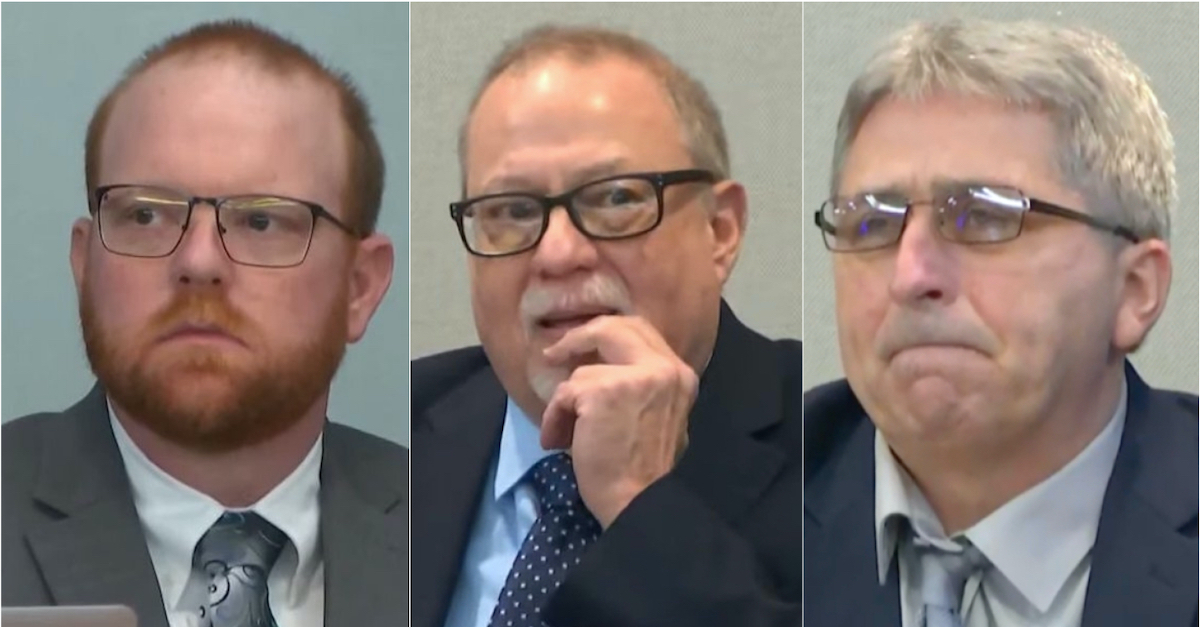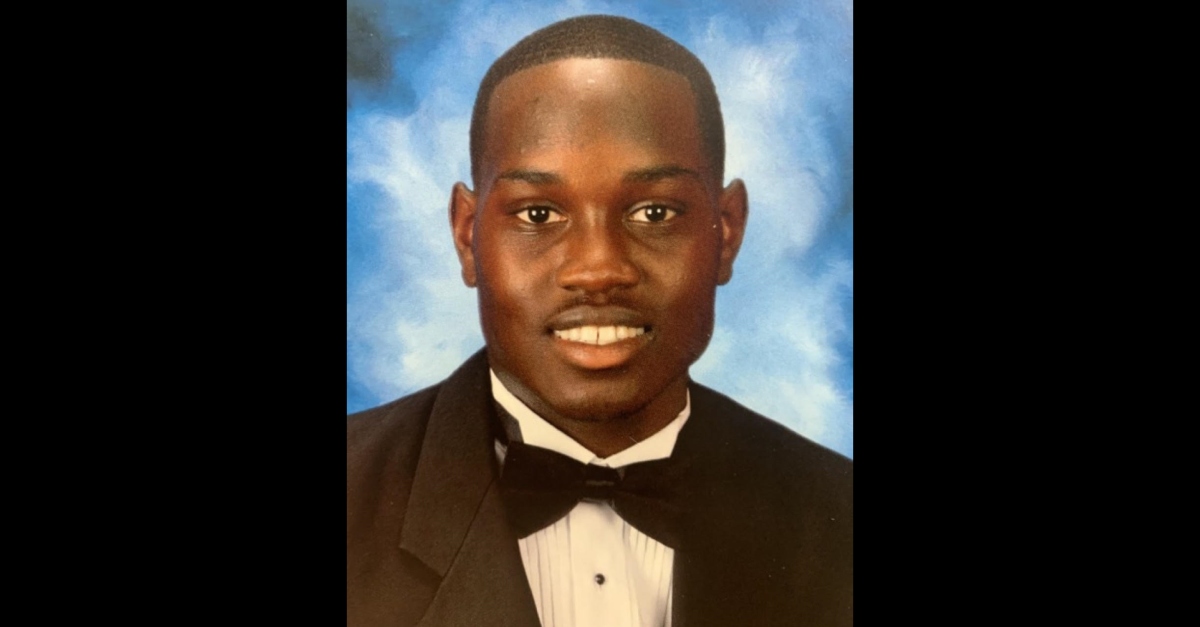
After pausing for a full minute to reflect upon the “terror” experienced by their victim, a Georgia judge sentenced the three men convicted in November of murdering Ahmaud Arbery to life in prison.
Two of the three men—gunman Travis McMichael and his father Greg McMichael—will not have the possibility of parole.
On Nov. 24, a Georgia jury found the McMichaels and their accomplice William “Roddie” Bryan guilty of a raft of charges. The younger McMichael, who shot an unarmed Arbery at point-blank range, did not escape any of the charges leveled against him, including malice murder, four counts of felony murder, two counts of aggravated assault, one count of false imprisonment, and one count of engaging in a criminal attempt to commit a felony.
Though the elder McMichael and Bryan were acquitted of malice murder, their felony murder convictions had a floor of life imprisonment. Bryan’s attorney Kevin Gough unsuccessfully filed motions before Friday’s hearing seeking to take life without the possibility of parole off the table and remove the mandatory minimum penalty.
“A Dangerous Endeavor”
Once Judge Timothy Walmsley denied Bryan’s motions, his only sentencing decision remaining at the hearing involved whether to allow the men the possibility of parole. In two instances, he did not.
Before pronouncing his sentence, Walmsley called for a minute of silence in court — representing a “fraction” of the roughly 5-minute period when Arbery was chased. He said he kept coming back to the “terror” in the mind of the young man being pursued.
“As we all now know, based upon the verdict that was rendered in this court in November, Ahmaud Arbery was murdered,” Walmsley said. “It was a tragedy, a tragedy on many, many levels.”
Walmsley said that he hoped that the case would provide a lesson: “Taking the law into your own hands is a dangerous endeavor.”
“This was a killing,” the judge said. “It was callous, and it occurred, as far as the court is concerned based upon the evidence, because confrontation was being sought.”
Unlike the McMichaels, Walmsley said, Bryan showed remorse. And so the judge granted him the possibility of parole.
On Feb. 23, 2020, Arbery was in the Georgia neighborhood of Satilla Shores when the three men started pursuing him. The trio cornered him after chasing him with their pickup trucks, and Travis McMichael fired three shots at him, killing him during a confrontation that Bryan captured on video.

Ahmaud Arbery.
Months would pass without any action from local authorities until Bryan’s video of the murder surfaced. The footage was leaked by a lawyer who consulted with killers, believing the video would support their claim of self-defense. Instead, the video galvanized a movement, sparking protests by Black Lives Matter activists and an investigation by Georgia state authorities. The men were charged soon after the disclosure.
“Expanding Our Definition of What a Neighbor May Be”
The victim’s father Marcus Arbery told the judge that the images of his son’s death replay constantly in his mind.
“When I close my eyes, I see his execution in my mind over and over,” he said in his victim impact statement. “I’ll see that for the rest of my life.”
The father said that it “doesn’t sit right” that father and son Travis and Greg McMichael can sit next to each other in court every day when he will never again have that privilege—”not at a dinner table, not at a holiday, and not anywhere.”
“Not only did they lynch my son in broad daylight, but they killed him while he was doing what he loved more than anything: running,” the elder Arbery said. “That’s when he felt most alive, most free, and they took all of that from him.”
When he became a father, Marcus Arbery added, he became a protector.
“I know in my head there was nothing I could have done to save my son—to have saved him from evil and hate,” he continued. “My heart is broken and always will be broken.”
At one point of his sentencing, Judge Walmsley waxed philosophical about the possibility of closure for a crime that gripped the nation.
“In this case. I think many people are seeking closure—the mother, father, the community and maybe even parts of the nation,” Walmsley said. “The closure is hard to define, and it is a granular concept. It’s seen differently by all, depending on their perspective in the prism of their lives. Instead of closure may be best to see today’s proceeding as an exercise and accountability: We are all accountable for our own actions.”
The McMichaels and Bryan insisted that they tried to effectuate a citizen’s arrest of Arbery, whom they baselessly claimed to have committed a burglary at the construction site of Brunswick, Ga. homeowner Larry English. Though Arbery was spotted in surveillance footage on English’s property—and he was seen there on the night of the murder—English testified that it was “common” and “normal” for the site to attract onlookers.
Judge Walmsley declared that the case should lead to “expanding our definition of what a neighbor may be and how we treat them.”
“I argue that maybe a neighbor is more than the people who just own property around your house,” he added. “I believe that in assuming the worst in others, we show our worst character.”
The prosecution described the case during opening statements as one about “assumptions and driveway decisions.” Assistant District Attorney Linda Dunikoski told the jury that the men jumped to the wrong conclusions when seeing, in the words of Greg McMichael on a 911 call, a “Black male running down the street” away from English’s property. That jury reviewed the 911 call of the elder McMichael making that remark during deliberations.
Greg McMichael also told a Glynn County police officer that Arbery was “trapped like a rat” after he and his co-defendants chased him—and he called the slain Arbery an “asshole” as he lay dead and bloody on the ground, the jury heard.
Dunikoski cited that profanity as evidence he had “no remorse shown and certainly no empathy.”
“Let Them Be Fully Committed to the Consequences”
Though Travis McMichael touted his experience in the U.S. Coast Guard and his father boasted of his decades in law enforcement, Dunokoski said that murder negates the “99 good deeds” the defense attorneys may highlight of their clients.
“When you take another person’s life, it can’t be undone, can’t be taken back,” she noted. “There is no do-over. It’s final.”
Travis McMichael’s attorney Bob Rubin urged the judge not to decree anything similarly irrevocable.
“The only purpose of a life without parole sentence, your honor, is vengeance, is retribution,” Rubin said, adding that “vengeance is not a foundation” of the criminal justice system.
“Redemption is,” Rubin said.
Rubin added that granting the possibility of parole would allow his client and the nation to “heal.”
The speedy convictions of the men were notable given the composition of the jury: nine white women, two white men, and one Black man. Before trial, Judge Walmsley found “there appears to be intentional discrimination” in the defense’s use of peremptory strikes, but he said his hands were tied by precedent to address it.
Though issues of race were rarely discussed in the state trial, the topic likely will take focus in ongoing civil and criminal litigation. Arbery’s mother Wanda Cooper-Jones continues to pursue a federal civil lawsuit, filed on the one-year anniversary of Arbery’s death, accusing Glynn County law enforcement of a cover up of her son’s killing. The lawsuit claimed that Travis McMichael used a racial slur after shooting Arbery to death.
Asking the judge to have the men spend the rest of their lives in prison, Cooper-Jones appeared to take a shot at Greg McMichael’s attorney Laura Hogue, who sparked outrage during closing arguments when she made a remark about Ahmaud Arbery’s “long, dirty toenails” — a comment widely perceived as a dehumanizing and racist dog-whistle.
“I wish he would have cut and cleaned his toenails,” Cooper-Jones said. “I guess he would have if he knew he was going to be murdered.”
Hogue acknowledged that her words may have caused the family pain: “A vigorous defense often results in the sadness of a loved one,” she noted.
Cooper-Jones occasionally brought a tissue to her face and nose during her address, providing heartfelt remembrances for her son: “My family is going to miss Ahmaud. We’re going to miss his jokes, his impersonations, his warm smile.”
Asking for the “maximum sentence,” she added: “Ahmaud never said a word to them. He never threatened them. He just wanted to be left alone. They were fully committed to their crime. Let them be fully committed to the consequences.”
Federal prosecutors also separately charged the men for violating Arbery’s rights, allegedly “because of Arbery’s race and color.”
(Photo of the McMichaels and Bryan via Law&Crime Network; Photo of Ahmaud Arbery via attorney Benjamin Crump.)
Have a tip we should know? [email protected]